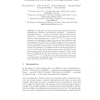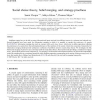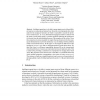143
click to vote
IWOCA
2010
Springer
14 years 9 months ago
2010
Springer
In this paper we obtain parameterized subexponential-time algorithms for p-Kemeny Aggregation (p-KAGG) -- a problem in social choice theory -- and for p-One-Sided Crossing Minimiza...
0
posts
with
0
views
0
views
132
click to vote
SYNTHESE
2008
15 years 2 months ago
2008
Axiomatic characterization results in social choice theory are usually compared either regarding the normative plausibility or regarding the logical strength of the axioms involved...
125
click to vote
KER
2008
15 years 2 months ago
2008
Computational social choice is a new discipline currently emerging at the interface of social choice theory and computer science. It is concerned with the application of computati...
126
click to vote
JAIR
2006
15 years 2 months ago
2006
A multiagent system may be thought of as an artificial society of autonomous software agents and we can apply concepts borrowed from welfare economics and social choice theory s t...
108
click to vote
INFFUS
2006
15 years 2 months ago
2006
Intelligent agents have to be able to merge informational inputs received from different sources in a coherent and rational way. Several proposals have been made for information m...
141
click to vote
DAGSTUHL
2007
15 years 3 months ago
2007
Computational social choice is an interdisciplinary
eld of study at the interface of social choice theory and computer science, with knowledge
owing in either direction. On the o...
128
click to vote
ECSQARU
2001
Springer
15 years 7 months ago
2001
Springer
Abstract. Intelligent agents have to be able to merge inputs received from different sources in a coherent and rational way. Recently, several proposals have been made for the merg...
115
click to vote
JELIA
2004
Springer
15 years 7 months ago
2004
Springer
Abstract. Results in social choice theory such as the Arrow and GibbardSatterthwaite theorems constrain the existence of rational collective decision making procedures in groups of...
151
click to vote
LORI
2009
Springer
15 years 9 months ago
2009
Springer
Arrow’s Theorem is a central result in social choice theory. It states that, under certain natural conditions, it is impossible to aggregate the preferences of a finite set of i...





